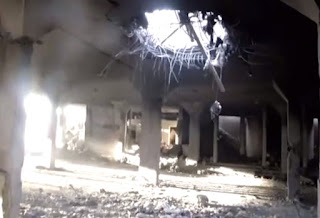ISR comment: U.S. administration already admitted that it provided weapons, selection of targets, and refueling assistance to Saudi forces engaged in a war on Yemen. Saudi attack on civilians in a funeral hall is a war crime. The question, then, is U.S. responsible for Saudi actions that result in committing war crimes. Reuters unveiled documents that night help answer that question.
Warning: Some content is graphic and may not be suitable to all viewers and readers.
_________
The Obama administration went ahead with a $1.3 billion arms sale to Saudi Arabia last year despite warnings from some officials that the United States could be implicated in war crimes for supporting a Saudi-led air campaign in Yemen that has killed thousands of civilians, according to government documents and the accounts of current and former officials.
State Department officials also were privately skeptical of the Saudi military's ability to target Houthi militants without killing civilians and destroying "critical infrastructure" needed for Yemen to recover, according to the emails and other records obtained by Reuters and interviews with nearly a dozen officials with knowledge of those discussions.
U.S. government lawyers ultimately did not reach a conclusion on whether U.S. support for the campaign would make the United States a "co-belligerent" in the war under international law, four current and former officials said. That finding would have obligated Washington to investigate allegations of war crimes in Yemen and would have raised a legal risk that U.S. military personnel could be subject to prosecution, at least in theory.
For instance, one of the emails made a specific reference to a 2013 ruling from the war crimes trial of former Liberian president Charles Taylor that significantly widened the international legal definition of aiding and abetting such crimes.
The ruling found that "practical assistance, encouragement or moral support" is sufficient to determine liability for war crimes. Prosecutors do not have to prove a defendant participated in a specific crime, the U.N.-backed court found.
Ironically, the U.S. government already had submitted the Taylor ruling to a military commission at Guantanamo Bay, Cuba, to bolster its case that Khalid Sheikh Mohammed and other al Qaeda detainees were complicit in the Sept 11, 2001 attacks.
The previously undisclosed material sheds light on the closed-door debate that shaped U.S. President Barack Obama’s response to what officials described as an agonizing foreign policy dilemma: how to allay Saudi concerns over a nuclear deal with Iran - Riyadh's arch-rival - without exacerbating a conflict in Yemen that has killed thousands.
The documents, obtained by Reuters under the Freedom of Information Act, date from mid-May 2015 to February 2016, a period during which State Department officials reviewed and approved the sale of precision munitions to Saudi Arabia to replenish bombs dropped in Yemen. The documents were heavily redacted to withhold classified information and some details of meetings and discussion.
An air strike on a wake in Yemen on Saturday that killed more than 140 people renewed focus on the heavy civilian toll of the conflict. The Saudi-led coalition denied responsibility, but the attack drew the strongest rebuke yet from Washington, which said it would review its support for the campaign to "better align with U.S. principles, values and interests." Source



















































No comments:
Write comments